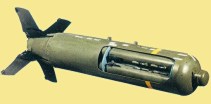2007年VOA标准英语-Study: Millions Affected by Cluster Bombs(在线收听)
Geneva
16 May 2007
In a just released report Wednesday, Handicap International says hundreds of millions of people worldwide face a daily risk of death or maiming by cluster bombs. Lisa Schlein has more for VOA from Geneva, where the group launched its report.
 |
| CBU-97 Cluster Bomb |
The report documents the impact of cluster munitions in 25 countries and areas, including Afghanistan, Kosovo and Laos. It says data in most of these countries is scarce because they tend to be poor with few resources to keep track of the problem.
The head of Handicap International's policy unit, Stanislas Brabant, puts the number of casualties from cluster munitions at 100,000. But he says this number is likely to be higher. He tells VOA cluster bombs not only kill and maim innocent civilians, they also devastate the economies of families and communities.
"A large chunk of the casualties are people who are feeding their families while working hard, sometimes in countries that are already devastated by war and that are trying to recover," he said. "Families that are already fragile and often the people who are injured are the ones that work, those who either grow the land or take care of the cattle. These are people who are the breadwinners. People who support their families."
The study says many people are unaware of the dangers from unexploded cluster bombs that remain long after a war is over. Children in these areas are in particular danger, because they often confuse the weapons with toys and pick them up.
 |
| A US B-1B Lancer unleashes cluster munitions |
He says there are reports the United States has dropped cluster bombs in Iraq and Afghanistan over the last year and that Russia still uses these weapons in Chechnya.
He says cluster munitions also have been used by what he calls non-state actors.
"This is something quite worrying," he added. "Hezbollah used cluster munitions in Israel last summer. The Taleban has also use used sub-munitions, cluster munitions also. So, that underlines really the need for a strong treaty now to ban these weapons and to prevent [their] proliferation, in particular to these kind of groups."
The Handicap International report is being released one week before governments gather in Lima, Peru, to discuss a draft text of a new treaty to ban cluster munitions and provide assistance to their victims.
Opponents of cluster bombs believe momentum is building for a legally binding treaty to ban them. They see parallels with the global campaign that succeeded in achieving an international treaty banning land mines.